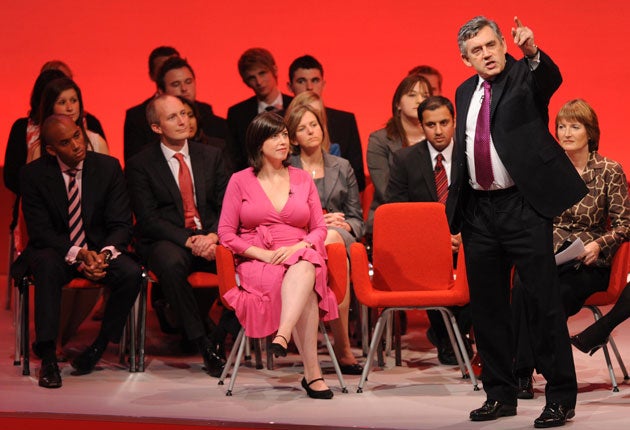Excessive bonuses to be banned in war on greed
Chancellor to bring in legislation within weeks designed to curb culture of risk that precipitated global financial meltdown

Your support helps us to tell the story
From reproductive rights to climate change to Big Tech, The Independent is on the ground when the story is developing. Whether it's investigating the financials of Elon Musk's pro-Trump PAC or producing our latest documentary, 'The A Word', which shines a light on the American women fighting for reproductive rights, we know how important it is to parse out the facts from the messaging.
At such a critical moment in US history, we need reporters on the ground. Your donation allows us to keep sending journalists to speak to both sides of the story.
The Independent is trusted by Americans across the entire political spectrum. And unlike many other quality news outlets, we choose not to lock Americans out of our reporting and analysis with paywalls. We believe quality journalism should be available to everyone, paid for by those who can afford it.
Your support makes all the difference.Alistair Darling will today announce a drive against the "reckless culture" that brought the banks to their knees – starting with a crackdown on annual City bonuses.
Ministers are anxious to head off embarrassing headlines disclosing that major financial institutions are lavishing multi-million-pound rewards for senior staff this Christmas. The Chancellor will publish legislation within weeks to outlaw exorbitant handouts and penalise financial institutions that attempt to pay them.
The new rules, in line with an agreement between the leaders of the G20 largest industrialised nations in Pittsburgh last Friday, will form a key measure in the Queen's Speech in November, and will be designed to end "the reckless culture that puts short-term profits over long-term success".
The legislation will ban the "bad old days" of automatic payment of handouts every year, requiring that bonuses are deferred over time so they can be clawed back if they are not warranted by long-term performance.
"We won't allow greed to ever again endanger the whole global economy and the lives of millions of people," the Chancellor will tell the Labour conference in Brighton.
But as the new law cannot come into force until next year, Mr Darling will meet senior bank executives within days to urge them to show voluntary restraint when it comes to this year's bonuses.
The Prime Minister also warned yesterday that there was international unanimity over the need to stop rewarding City traders for speculation and short-term deals. He also announced plans for a Fiscal Responsibility Act to bind legally the Government – whether it is Labour or Conservative – to specific reductions in borrowing. He has pledged to halve Britain's £175bn deficit within four years.
In today's speech, Mr Darling will say last year's financial crisis was both a "test of leadership for the Government" and "a test of judgement for the Conservatives". He will argue: "It was a test they failed at every turn."
The Chancellor will insist there will be a similar choice between the parties over reducing the national debt. He will claim that under David Cameron, the Tory Party has "reverted to type and has shown it is relishing the chance to swing the axe at the public services millions rely on".
As the general election battle against the Tories dominated fringe meetings yesterday, Jon Cruddas, an influential Labour backbencher, criticised Mr Cameron's party for displaying "a sense of entitlement" in their campaigning, adding that Labour needed to "go down fighting" rather than "meekly drifting into defeat".
He warned colleagues not to descend into in-fighting should the party lose the next election. "We have to make sure that we hold things together," he said. "We have to make sure that we don't collapse into some indulgent internal, factional fight. We have done that in the past."
James Purnell, who resigned from the Cabinet in the summer after losing confidence in Mr Brown's leadership, urged the party to return to Tony Blair's policy of placing education at the "front and centre" of its election manifesto.
He also warned that the party was losing votes because of the BNP. "The reasons are mostly to do with people's hopes for their families and issues such as immigration and crime. If they are pessimistic about it, they are likely to have switched away from us and vote for the BNP," he said.
He added that the Government had been poor in presenting its arguments on cuts and spending, even though it had made the right decisions in bailing out the banking system. "Sometimes it has sounded like we couldn't protect your job and we weren't going to do very much to help you get the next one," he said.
He also moved to quash speculation that he would run for the Labour leadership after the next election, telling a fringe meeting he was "not interested in frontbench politics", and had "no intention" of running for the position.
Join our commenting forum
Join thought-provoking conversations, follow other Independent readers and see their replies
Comments